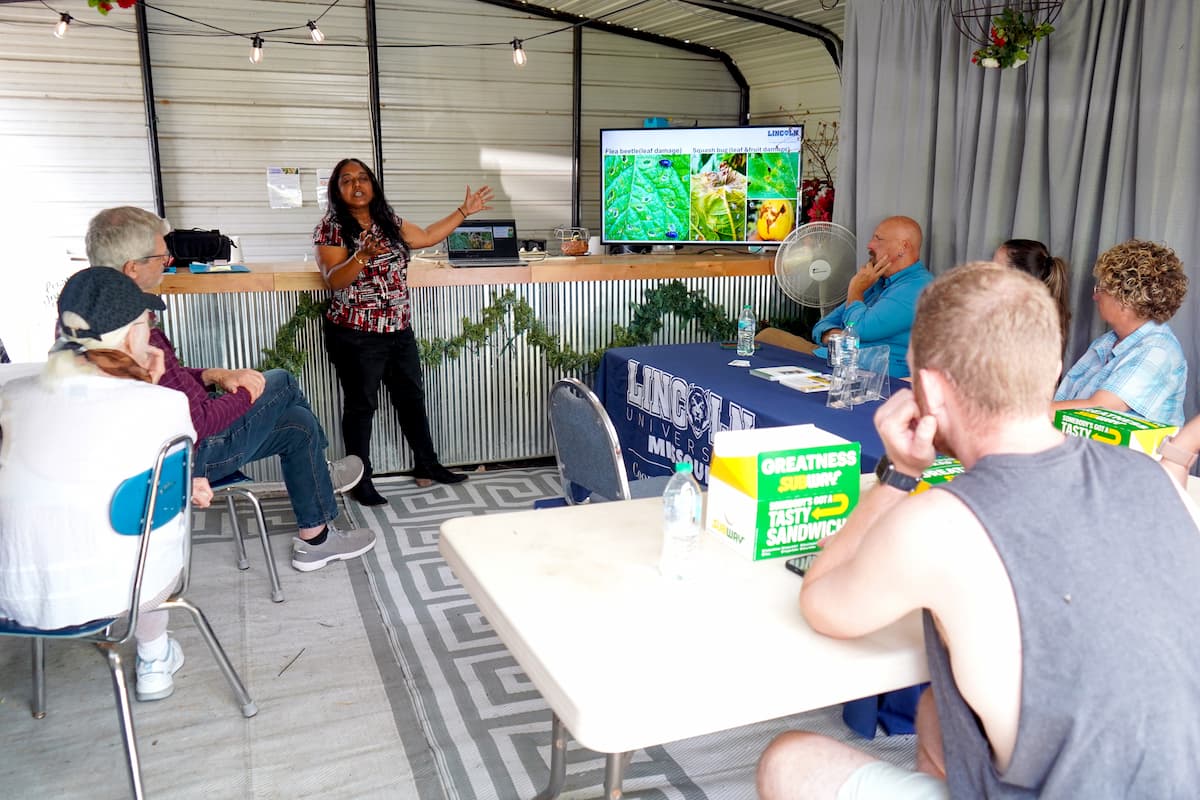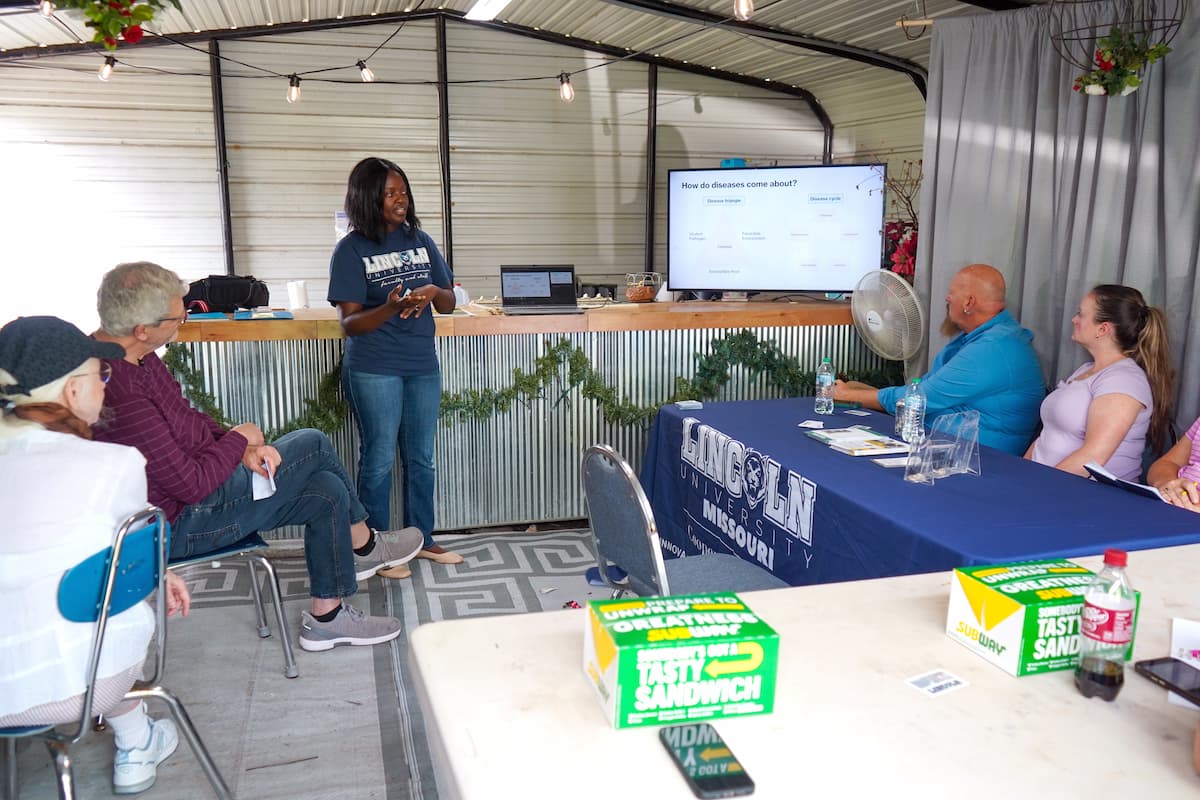Lincoln University and Harvick Farms Partner to Support Missouri Growers
Office of Communications and Marketing
Young Hall
820 Chestnut Street
Jefferson City, MO 65101
 Dr. Anitha Chitturi, assistant professor and state extension specialist for Integrated Pest Management, discusses specific pests and their effects on crops with local farmers during the Know Your Pests and Diseases workshop at Harvick Farms.
Dr. Anitha Chitturi, assistant professor and state extension specialist for Integrated Pest Management, discusses specific pests and their effects on crops with local farmers during the Know Your Pests and Diseases workshop at Harvick Farms.
Squash bugs, aphids, wilt and mildew can quickly undo months of work in the garden. To help growers protect their crops, Harvick Farms partnered with the Lincoln University of Missouri (LU) Integrated Pest Management (IPM) program to host the Know Your Pests and Diseases workshop.
The event took place at Harvick Farms in Southeast Missouri, drawing 18 participants from Barry, McDonald and Cole counties. Attendees included local farmers, gardeners and university specialists for practical learning and discussion.
Located in Barry County, Harvick Farms began four years ago and has since grown into a site for food production and community education. The farm offers consultations and classes on composting, growing food, preserving harvests and more.
“We asked our community what they most wanted to learn, and pests and diseases came up repeatedly,” said Lainey Harvick, who leads Harvick Farms. “People want to know how to fight back against what’s destroying their gardens. That’s why this partnership with Lincoln University has been so valuable.”
Harvick Farms connected with Lincoln University specialists through Lesa Queen, a field staff member with LU’s Innovative Small Farmers’ Outreach Program (ISFOP). The workshop featured presentations from Dr. Anitha Chitturi, LU assistant professor and state extension specialist for the Integrated Pest Management (IPM) program, and Dr. Waana Kaluwasha, LU assistant professor of plant pathology and researcher.
Chitturi’s session focused on insect identification and sharing targeted strategies to prevent crop damage. She discussed the biology and life cycles of pests, highlighting how each pest affects cucurbit crops — such as squash, cucumbers and zucchini — and the signs growers should watch for during the season.
Participants also learned about practical monitoring tools like yellow sticky traps to detect crop pests, as well as scouting techniques to identify early infestations in the field.
“Regular monitoring and scouting are critical for early detection, and timing is everything,” Chitturi said. “Acting early can make a big difference in protecting crops.”
Chitturi emphasized cultural practices such as field sanitation, planting trap crops like Blue Hubbard squash to lure pests away from main crops and using row covers to protect young plants from egg-laying insects. For gardeners seeking organic options, she recommended crop rotation to disrupt pest life cycles and spray applications such as insecticidal soap and neem oil for mitigating pests.
 Dr. Waana Kaluwasha, assistant professor of plant pathology, talks with Know Your Pests and Diseases Workshop attendees about the cycle of common plant diseases and how to treat them.
Dr. Waana Kaluwasha, assistant professor of plant pathology, talks with Know Your Pests and Diseases Workshop attendees about the cycle of common plant diseases and how to treat them.
Following the pest session, Dr. Waana Kaluwasha turned the focus to plant diseases that harm cucurbit crops like squash, cucumbers and watermelons. She described common issues such as powdery mildew, bacterial wilt and root-knot nematodes — problems that often spread quietly and can destroy a harvest before growers realize what’s happening.
She emphasized prevention as the first line of defense, encouraging gardeners to select disease-resistant plant varieties, use clean seeds and transplants and avoid planting the same crops in the same location year after year. These practices, she explained, help disrupt disease cycles in the soil and reduce reinfection risks.
She also recommended watering plants at the base to keep foliage dry and improving airflow between rows to reduce humidity — conditions ideal for fungal pathogens. Kaluwasha stressed the importance of clearing plant debris and managing insect pests like cucumber beetles, which can carry bacterial diseases.
“A combination of management methods is always recommended,” Kaluwasha said. “No single strategy works on its own.”
The practical advice from Lincoln University specialists resonated with attendees, many of whom left the workshop eager to apply what they had learned in their own gardens.
“I liked how this wasn’t just for big farmers — even a home gardener like me benefited,” said participant Steve Kajtor. “I’ll be looking at my garden differently now, paying attention to things I might have missed before.”
Kajtor had struggled in past seasons with pests that wiped out plants just as they were beginning to thrive. One of the most valuable takeaways, he said, was learning to distinguish between harmful insects and those that are beneficial to the garden. Before attending, he often removed any beetles he saw, not realizing some species prey on pests like aphids.
The disease session also gave him new ideas to strengthen his plants’ resilience. He found the discussion on moisture management and crop rotation particularly helpful for preventing fungal and bacterial problems.
“Workshops like this are important because they bring knowledge directly to the community,” Harvick said. “It’s not just theory — it’s what people can do right now.”
The workshop showed how partnerships between institutions like Lincoln University and community sites such as Harvick Farms can strengthen food production and education in Missouri. By blending university expertise with a grassroots learning hub, the event equipped farmers and gardeners with tools to build healthier, more resilient growing systems.
For more information about Integrated Pest Management, contact Dr. Anitha Chitturi at chitturia@lincolnu.edu. For questions about plant diseases, reach out to Dr. Waana Kaluwasha at kaluwashaw@lincolnu.edu.
